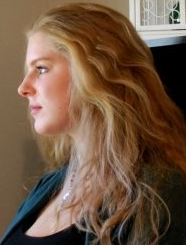by Susan Dennard
You all may recall my gushing recommendation of Tara Hudson’s Hereafter a few weeks back. Well, I am now absolutely ecstatic to share my recent interview with her!
Born and raised in Oklahoma, Tara Hudson graduated with a degree in law, mostly because she believed all the horror stories about English majors and their careers in the food-service industry. Luckily, she soon remembered how much she loved telling ghost stories, particularly to her girlfriends who liked visiting abandoned cemeteries as much as she did. Tara currently lives in Oklahoma with her husband, son, and a menagerie of ill-behaved pets.
Let’s get started, shall we?
So, Tara, when did you first start writing HEREAFTER? Was there any sort of inspiring moment behind it (like dreams of sparkly vampires—ha!)?
I actually remember the exact date I started writing HEREAFTER – April 14, 2009 – because I still have the email that I sent my best girlfriends, asking them to read the first chapter. But my inspiring moment, or event, happened in 2000, when I drew “first straw” to present a short story in my college Fiction Writing Workshop. I always had a fascination with old cemeteries (their history, their eerie sense of watchfulness), so I wrote a story about the type of person who might wake up in one. That early story haunted me, and almost ten years later, it grew into HEREAFTER.
Wow! That’s…impressive–I love that it’s been an idea boiling in your mind for so long. And I gotta say, you pull of the cemetery-creep-factor really well! When you set out to actually write it, were you a plotter or pantster?
I was a plotter, especially for HEREAFTER. I wrote the entire original manuscript based off of an outline, that set out a chapter-by-chapter sequence of events. But with ARISE, the second book in the Hereafter Trilogy, I totally pants-ed it. And you know what? The spontaneity worked, because I think ARISE blows HEREAFTER out of the water!
GASP! Oh my gosh, Tara, now you’ve got me drooling for ARISE. If the author thinks it’s great, it must be fan-freaking-tab-ulous! Plus, how awesome is that title–ARISE!? Now, tell us about your agent. Who is she and how did you win her heart?
My agent is the fantastic Catherine Drayton of InkWell Management. She was my dream agent – she represents Markus Zusak and Becca Fitzpatrick, for pete’s sake! – and I didn’t think I had a snowball’s chance of landing representation with her. But she read my entire manuscript over the course of one weekend and liked it. She didn’t offer me representation right away because she wanted me to do some revising. Lucky for me, only two days after I started revisions, Catherine received a call from HarperCollins looking for something along the same lines as HEREAFTER. With my permission, Catherine pitched my manuscript and Harper loved it. Of course, I wasn’t surprised when my new editor – the equally legendary Barbara Lalicki – wanted the exact same revisions Catherine had suggested!
Wow. My jaw is kinda on the floor with that story… HEREAFTER is (as I have told everyone) amazing, but to hear the concept was so high that editors wanted it just like that… Well, go Tara! So now that you’re all published (wee!), what are you working on now?
Right now, I’m winding down revisions for ARISE and starting my outline for ELEGY, the final book in the Hereafter Trilogy. I’m also vacillating between two new projects – another YA paranormal and a YA fantasy – both of which I kind of love.
Awesome! I can’t lie that I’m really excited to hear you’re working on new projects–it’s my purely selfish desire to read them!! Finally, do you have any big words of writerly advice?
You can do this.
I get how that might sound trite, or like something your mother would say. But when I was writing HEREAFTER, I had a really demanding day job. Then, after I sold HEREAFTER and began revising it, I still had that day job as well as a brand new pregnancy. Then, after HEREAFTER was finished and I was under an intense deadline to write ARISE, I had the intense day job and a brand new baby.
And you know what? I did it. With all those life responsibilities, I wrote two books of which I’m extremely proud. So whatever you’re struggling with while trying to write or query or submit or revise, you CAN do this, mostly because you love it that much.
We can do it! I’ve been terrified of tackling my own book 2, and I gotta say: you’ve made me feel better, Tara. This is wonderful advice and so, so true.
Thank you for taking the time out of your very busy life to answer my questions, and I can’t wait to see your other books in stores. (No seriously, if there’s anyway you can hook me up with an ARC for ARISE… ::nudge, nudge::)
Now, for those of you Americans out there, Happy Fourth of July! Go out and read Hereafter–you won’t regret it!
~~~
You can learn more about Tara Hudson on her website , blog, or twitter!
Susan Dennard is a writer, reader, lover of animals, and eater of cookies. She is repped by Sara Kendall of NCLit, and her debut, SOMETHING STRANGE AND DEADLY, will be available from Harper Children’s in 2012. You can learn more about her on her blog or twitter.



















 LTWF Facebook
LTWF Facebook LTWF Twitter
LTWF Twitter